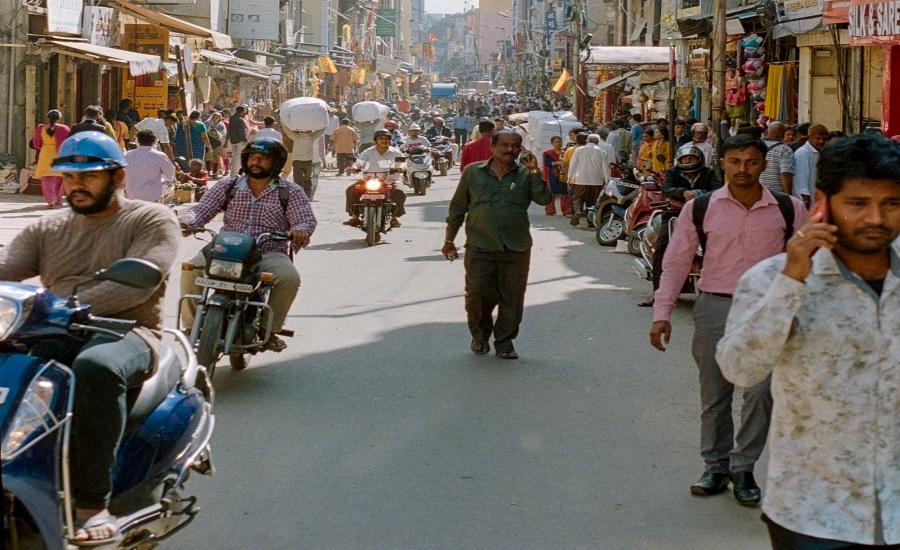–Shams Khan
As the government has decided to return to business as usual, the move has raked up a debate over the effectiveness of lockdown in fighting Coronavirus. However, there has been a consensus that the country like India whose 90% workforce is employed in unorganized sector—with barely having any job security and other employment benefits—cannot afford shutdown anymore.
The hand to mouth sections of the society such as migrant labourers, hawkers, daily wagers suffered unprecedented difficulties because of virtual closure of economy. The heart wrenching visuals of famishing migrant labourers rushing hundreds of kilometers on feet towards their home symbolized the trauma of lockdown which left many of them died on the way due to hunger or accidents.
Before the imposition of lock down,experts had suggested that this would be very difficult to enforce in a densely populated and poor country like India, where majority of people live in shared compact spaces. On the other hand, a fairly large workforce would still be required outside of their home for providing health and sanitation services as well as delivering essentials goods.
In a New York Times piece titled, ‘The Rich Love India’s Lockdown. For the Poor It’s Another Story’, Ruchir Sharma wrote, “My immediate concern was that in its usual way, India was copying measures that rich countries take to protect public safety and welfare but that low-income countries cannot afford. I was in touch with officials in other major emerging countries and none advocated total lockdowns because without the resources to support new armies of the unemployed, closing the economy would only lead to more hunger and death.”
So now, after more than two months of lock down, the country has found itself in a dilemma; because the economy needed to be opened up as the closure has started to take heavy toll while on the other hand, the number of COVID-19 cases are still shooting. In such a scenario, many analysts called out the government for hasty and unplanned lock down.
Shivanand Tiwari, National Vice-President of Rashtriya Janata Dal, speaking to TheNewsWeb pointed out, “This is because the government imposed the extreme measure (i.e., lock down) without proper planning and home work. Other countries such as South Africa which have large migrant workers had given them enough time to get back to their origin. Indian government was initially busy in Namaste Trump event and toppling of congress government in Madhya Pradesh. In the absence of proper health screening and quarantine facilities for International passengers, the virus spread in the country.”
“For example, more than 1.5 lakhs migrant workers entered Bihar in the last days of March through various routes; yet, they were not found infected with the virus. But many of those arriving by shramik specials now are having Coronavirus. This is simply because they were rendered jobless and homeless and had no scope for social distancing. Thus, the hasty lockdown only aggravated the whole scenario,” Tiwari added.
However, few analysts defend the government’s handling of the crisis. The Coronavirus is one if it’s kind phenomenon which had no previous precedent and there was no certainty over its spreading features; therefore, taking refuge in movement restrictions to slow down, as well as, buying the time to understand the virus was only viable option available at that time, they say. It is also argued that the government cannot be blamed for taking prompt action that saved millions of people from getting infected with the virus.
But the counter argument is that 90% of COVID-19 deaths have occurred in the countries situated between 30 and 60 of north platitude. According to a MIT study, most of these countries have temperature between 5 and 11 degree centigrade. Diseases like influenza and pneumonia are big killers in cold countries of Europe and America. For example, eighty thousand people died of flu in the United States of America in 2018. Similarly, Zika Virus, Ebola Virus, Swine Flu and Bird Flu did not have big impact in Indian subcontinent.
Moreover, epidemiologists, such as former principle of Christian Medical College, Vellore and Chairman of the scientific advisory committee, National Institute of Epidemiology Dr. Jayaprakash Muliyil, have throughout maintained that lock down is not a solution. Dr. Muliyil has repeatedly said that once any virus made inroads in human civilization or for that matter, in any species, it stays and spreads for quite long, till the creature does not develops immunity towards it. The same is true with COVID-19. Therefore, we must adjust our life to live with this new reality.
The actual data of the economic implication of lockdown is awaited. Similarly, no comprehensive study has been done yet on how much impact the lockdown had in slowing down the spread of virus. In such a scenario, it would be premature to pronounce any verdict. Still, general perception is that lockdown has failed to curb the spread of virus.
(Shams Khan is associated with ‘Bihar Times’, The views are personal)





